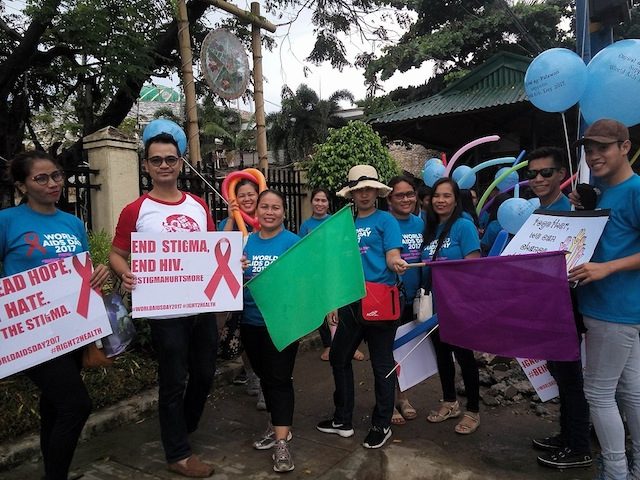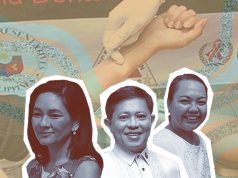
MANILA – “Respect” and “love” have not co-existed comfortably with the condom, but if this latex barrier against disease is promoted in the context of self-respect, love and care, more Filipinos will use it to protect themselves from sexually transmitted infections, according to Dr. Louie Ocampo, the new Philippine country director of the Joint United Nations Programme on HIV/AIDS (UNAIDS).
Ocampo, who assumed office on Jan. 8, 2018, offered an “alternative mindset associated with the use of condoms by thinking beyond its health-related significance and repackaging it in the context of self-respect, love and care for people” to help fill the gaps that government and civil society groups have been struggling with in asking people to use condoms.
He said the use of the condom as a preventive and protective measure against infections must revolve around a person’s decision to have a compassionate behavior. “You do not want to contract a virus because you have a high regard for yourself, and you do not want to transmit the virus because you consider the welfare and safety of the other person. This is a different approach for people to see the relationship of their health to self-respect and respect for others.”
Ocampo, 44, chief of the medical and professional staff of the Ospital ng Palawan in Puerto Princesa City since 2015 until his UN appointment, is the first community doctor and one of the youngest to lead the UNAIDS office in the Philippines, headed previously by Filipinos who were picked from national and international posts.
The UNAIDS leads the global advocacy to end AIDS by working with and providing technical support to government, civil society and the private sector. Established in 1996, it is made up of 11 UN partners and civil society organizations
In explaining his approach to condom use, Ocampo cited the Health Belief Model (HBM), a psychological model that seeks to explain and predict health behaviors by focusing on individuals’ attitudes and beliefs. He said the most successful public health programs are based on an understanding of health behaviors and the context in which they occur. The HBM posits that people’s perceptions about their health risks and the benefits of taking action to avoid disease, influence their readiness to act on their situation.
Using this theory, Ocampo said there is a need to strengthen the association between condom and sexually transmitted infections such as HIV, and one way to do this is to increase initiatives through media campaigns, peer education and testimonials from those affected with the disease.
Ocampo took office as the Philippines recorded the fastest-growing HIV epidemic in the Asia-Pacific, with a 141 percent increase in new infections from 2010 to 2016, according to a July 2017 UNAIDS report. From about 4,300 Filipinos with HIV in 2010, the number grew to 10,500 in 2016, making the country one of only eight countries in the region with new HIV infection rates of above 90 percent.
There are now 31 Filipinos who get infected by HIV each day, according to the Department of Health, based on its official registry of cases reported by hospitals for October 2017 that recorded 918 new cases and a cumulative total of 48,839 since 1984, when infections were first reported.
Majority are aged 15 to 24 and 90 percent are men who have sex with men (MSM). More than 80 percent of infections are through sexual contact but condom use is low at only 44 percent or slightly half the global goal of 80 percent.
HIV-AIDS STIGMA STILL WIDESPREAD
The stigma attached to the disease is still widespread even if the Philippines has been reporting HIV and AIDS in its roster of public health threats for three decades now.
Ocampo’s HIV advocacy started prior to his government employment and was in response to witnessing the effects of stigma, and his own friends succumbing to AIDS-related deaths.
Even doctors who have HIV, he said, are not spared of the stigma that forces them to leave the country not just to seek treatment abroad but also to escape being ostracized.
One of his HIV-positive doctor-friends, Ocampo said, migrated to the US for fear of being discriminated against, while another friend died of AIDS-related illness and another became blind from cytomegalovirus retinitis, an infection of the retina of both eyes as a result of HIV infection.
“Stigma and discrimination have pushed those affected to hide, not access treatment and decide to rather die than put themselves under the scrutiny and judgment of people around them,” he said.
He singled out health professionals themselves who discriminate especially against MSM and transgendered women. He said health service providers must be trained on stigma reduction, while noting a fast turnover of personnel in health facilities.
Counseling, a crucial requirement prior to and after an HIV test and is a determinant in linking a person who tests positive to care and adhering to treatment, is not being done in most of the service delivery points. Although guidelines on counseling are in place, Ocampo said there is a need to continuously monitor its implementation to see if it is being properly conducted.
The new UNAIDS country director brings with him a fresh perspective from his community experience in Puerto Princesa City, one of eight cities whose “concentrated epidemics” among men and transgendered women have breached the UN’s measure of 5-percent threshold of HIV prevalence which means the virus can spread fast in no time to the rest of the population.
The high-prevalence cities are Cebu (14 percent), Cagayan de Oro (9.3 percent), Puerto Princesa (7.7 percent), Quezon City (7.4 percent), Mandaue (6.5 percent), Paranaque (5.9 percent), Davao (5.5 percent) and Makati (5.2 percent).
It was in the local setting where Ocampo learned the importance of public consultation. “Most health policies are created at the national level but the devolved set-up of our health system has been a major obstacle in carrying out these policies to the community,” he explained. “Implementers usually lack a sense of ownership as they were not involved in the process of crafting the policies where perceived and actual hurdles in implementation are often not properly identified and resolved.”
He said Palawan was no different from localities that lacked testing centers with trained personnel on HIV counseling and testing, no HIV treatment facility, and a non-functioning Local AIDS Council even as HIV cases were rising rapidly. But through coordination with the regional health office, the province was able to establish a treatment hub, the Ospital ng Palawan, for residents who no longer need to travel to Metro Manila to access testing and treatment.
Ocampo chaired the hospital’s HIV/AIDS Core Team, a multi-discipline medical team that can attend to a person with HIV, and was able to bridge the gap between diagnosis and link to care. He also served as public health services chief of the Palawan Provincial Health Office and provincial coordinator for STI (sexually-transmitted infections) and HIV/AIDS Prevention and Control Program.
Ocampo earned his Doctor of Medicine degree from the Pamantasan ng Lungsod ng Maynila, a Master’s in Public Health from the University of the Philippines and a Master in Management in Hospital Administration from Philippine Christian University. He has a bachelor’s degree in medical technology from the Far Eastern University.
Knowledge is key
The new UNAIDS country director said he will strongly advocate for the institutionalization of comprehensive sexuality education in the curriculum of all schools in the country that includes condom use. “Age-appropriate sexual health education should be taught prior to the age where the adolescents start exploring their sexuality,” he said, again citing the importance of looking at behavior.
“Knowledge is the primary ingredient to behavior change. Learning the right behavior at the onset is much easier than unlearning the bad ones. Only then we can change the bad practices of having unprotected sex to using the condom consistently and correctly during sexual activity.”
He said both the Responsible Parenthood and Reproductive Health Law of 2012 (RA 10354) and the Philippine AIDS Prevention and Control Act of 1998 (RA 8504) provide for comprehensive sexuality education that includes sexual health, children’s rights, and values formation.
Because the epidemic is shifting to MSM and the younger population, he said the government should revisit its policies by expending educational HIV prevention efforts and lowering the age of access to condoms and reproductive health information.
“Children may be particularly vulnerable to HIV due to inadequate sex education in schools and misguided policies requiring parental consent for those under 18 to purchase condoms or access HIV testing,” he said.
Ocampo also proposed that local government units and their Local AIDS Councils must have the ownership of programs by allocating funds solely for HIV services and activities without being dependent on the support of the DOH and the national government.
The League of Cities of the Philippines that adopted a resolution manifesting full support to the mayors’ compact to end the epidemic can lead the efforts in the community, he said. “I believe the national government would not be successful in this battle without the full support of the local governments. The battle is now at the field of every community, and we need the local health workers, policy-makers and local leaders to be at the forefront of this crusade.
Ocampo said he supports the establishment of more treatment facilities in strategic areas that should be part of the regular services provided by city or municipal health offices to bring services nearer to the community where they are needed.
Citing their hard work among key affected populations, he said he would like to be able to give civil society and nongovernment organizations additional funds to run their programs.
“The government must create a system to facilitate the transfer of government funds to the organizations and establish a mechanism to ensure transparency and accountability for the funding,” he said, adding that agencies such as Department of Budget and Management and the Commission on Audit should be attuned to this system.
(VERA Files is put out by veteran journalists taking a deeper look at current issues. Vera is Latin for “true.”)








